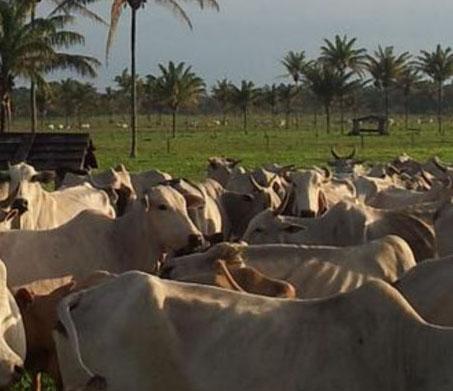
Submitted by Administrator on Mon, 02/10/2017 - 10:42
Is eating beef really bad for the climate? Is grass-fed beef better?
A newly published report adds clarity to the debate around the environmental impact of livestock farming: the team of researchers from Europe and Australia, including Erasmus zu Ermgassen, a third-year PhD student in the Department, distilled the available evidence to conclude that grass-fed livestock are unfortunately not a climate solution.
The livestock sector as a whole is responsible for 14.5% of global human-related greenhouse gas (GHG) emissions, making some argue that cuts in consumption are required to limit global warming to below the internationally agreed goal of 2-degrees. On the other side of the debate, others claim that grass-fed ruminants (cattle, sheep, and goats) benefit the climate because the lands they graze contain large stores of carbon; and crucially, that animals’ grazing actions help reduce carbon dioxide emissions through ‘soil carbon sequestration’ (i.e. storing carbon in grassland soils).
The study, published today, examined the nuances of this debate and has two key findings.
While grazing ruminants make important contributions to rural livelihoods, their potential contribution to soil carbon sequestration is small, time-limited, reversible and outweighed by the greenhouse gas emissions they generate. Ruminants contribute 80% of total livestock emissions of human GHG, even with careful grazing management the report found that this would only offset between 20-50% of annual emissions.
Rising animal production and consumption – of all kinds and in all systems – risks driving damaging changes in land use and associated GHG release. Purely grass-fed ruminants produce 1 gram of protein per person, per day – as compared to 32 g/person/day coming from all animal sources, and 49 g/person/day from plant sources. Yet, collectively ruminants use one quarter of the planet’s useable surface. Since grass-fed ruminants require large areas of land, it is not possible to carry on eating as much meat and obtain it through grass-fed systems alone (even with the additional feeding of agricultural by-products and food waste) – without incurring further deforestation and habitat loss. Despite claims to the contrary, increasing grass-fed ruminant numbers is therefore a self-defeating climate strategy, as any sequestration is offset by emissions.
While ruminants can graze low-quality agricultural land that cannot otherwise be farmed, their role in a low-carbon food system is therefore limited. Lead authors, Dr Tara Garnett and Cécile Godde, from the Food Climate Research Network at the University of Oxford and the Australian research institute CSIRO, respectively, conclude that “Ultimately, if high consuming individuals and countries want to do something positive for the climate, maintaining their current consumption levels but simply switching to grass-fed beef is not a solution. Eating less meat, of all types, is.”
Garnett T, Godde C, Muller A, Röös E, Smith P, de Boer I, Ermgassen E, Herrero M, van Middelaar C, Schader C and van Zanten H (2017). Grazed and confused? Ruminating on cattle, grazing systems, methane, nitrous oxide, the soil carbon sequestration question. Food Climate Research Network, University of Oxford. http://www.fcrn.org.uk/projects/grazed-and-confused
